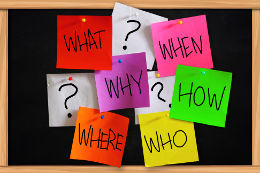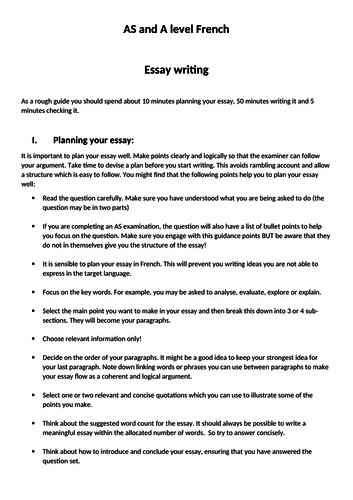Write an essay in French
Beyond the fact that writing an essay in French can be a good practice to improve your writing, you may also be asked to write one during your schooling. So, it is important to study the topic of French essay writing and get some useful tips..
» Tips and tricks for your French essay » The structure of a French essay » Sample French Essay

Tips and tricks for your French essay
When writing a French essay for school, you should always use a structured approach and good French skills to present your arguments in a focused way. Beyond French skills, there are also important formal requirements for a successful French essay. We will come back to this in detail later. First, you will find some useful tips and tricks that will help you write more compelling and better French essays in the future.
- Have a clear thesis and structure
- Do sufficient research and use reliable sources
- Use examples and arguments to support your thesis
- Avoid plagiarism and cite correctly
- Always check structure, grammar and spelling
When you write your essay at school or university, you need to make sure that the general structure of your essay, the presentation of the arguments and, above all, your French language skills play a role in the mark you will get. This is why you should definitely take a closer look at the structure of an essay as well as the most important grammar rules and formulations for French essays.
The structure of a French essay
In an essay, you deal at length and in detail with a usually given topic. When you write an essay in French, you must follow a certain structure. Below we show you what this structure looks like and give you some tips for writing the most important parts of your essay.

The Introduction
The introduction prepares the main body of your essay. You think of a meaningful title for your essay, you describe your thesis or your question, you give general information on the subject and you prepare your argument by giving an overview of your most important arguments.
Below are examples and phrases that you can use to write the introduction to your essay in French.
The title should be meaningful, concise and reflect the content of the essay.
Introductory paragraph
The first paragraph of your French essay should briefly introduce the topic and engage the reader. Here are some examples to help you write your essay:
Proposal or question
The central proposition or question of your French essay should be a clear and concise definition of the purpose of the essay. Use these examples to get a clearer idea of how to write theses in French:
Overview of Arguments and Structure
At the end of your introduction, describe the structure of the main part of your essay (your outline) and outline your argument. Here are some French expressions that will certainly help you write your essay:
The body of your essay

The main part of your French essay deals with the given topic in detail. The subject is studied from all angles. The main body of your essay follows a thread of argument and discusses in detail the main arguments of your thesis previously made in the introduction.
In the body of the text, you should discuss the subject of your essay in clear and concise language. To achieve this, we give you some wording aids as well as vocabulary and phrases that you can use to write your essay in French.
Formulation tools:
French vocabulary for essays.
In the conclusion of your French essay, you address the thesis of your essay, summarize the main points of your discussion in the main body, and draw a conclusion. On the basis of the arguments and the resulting conclusions, you formulate in the conclusion of your dissertation final thoughts and suggestions for the future. It is important that you do not add new information or new arguments. This should only be done in the body of your text.
Here are some wording guides to help you write your essay in French:
Sample French Essay
Les avantages des voyages linguistiques
Malgré les difficultés potentielles, les voyages linguistiques offrent aux apprenants une occasion unique d'améliorer leurs compétences linguistiques et de découvrir de nouvelles cultures, ce qui en fait un investissement précieux pour leur développement personnel et académique.
Les séjours linguistiques sont des voyages organisés dans le but d'améliorer les compétences linguistiques des participants. Ces voyages peuvent se dérouler dans le pays ou à l'étranger et durer d'un week-end à plusieurs semaines. L'un des principaux avantages des séjours linguistiques est l'immersion. Entourés de locuteurs natifs, les apprenants sont contraints de pratiquer et d'améliorer leurs compétences linguistiques dans des situations réelles.Il s'agit d'une méthode d'apprentissage beaucoup plus efficace que le simple fait d'étudier une langue dans une salle de classe.
Un autre avantage des séjours linguistiques est l'expérience culturelle. Voyager dans un nouveau pays permet aux apprenants de découvrir de nouvelles coutumes, traditions et modes de vie, et de se familiariser avec l'histoire et la culture du pays. Cela enrichit non seulement l'expérience d'apprentissage de la langue, mais contribue également à élargir les horizons et à accroître la sensibilisation culturelle.
Cependant, les séjours linguistiques peuvent également présenter des inconvénients. Par exemple, le coût du voyage et de l'hébergement peut être élevé, en particulier pour les séjours de longue durée. En outre, les apprenants peuvent être confrontés à la barrière de la langue ou à un choc culturel, ce qui peut être difficile à surmonter. Le coût et les difficultés potentielles des séjours linguistiques peuvent sembler décourageants, mais ils offrent des avantages précieux en termes d'épanouissement personnel et scolaire.
Les compétences linguistiques et les connaissances culturelles acquises peuvent déboucher sur de nouvelles opportunités d'emploi et améliorer la communication dans un cadre professionnel. Les bourses et les aides financières rendent les séjours linguistiques plus accessibles. Le fait d'être confronté à une barrière linguistique ou à un choc culturel peut également être l'occasion d'un développement personnel. Ces avantages l'emportent largement sur les inconvénients et font des séjours linguistiques un investissement qui en vaut la peine.
En conclusion, malgré les difficultés potentielles, les séjours linguistiques offrent aux apprenants une occasion unique d'améliorer leurs compétences linguistiques et de découvrir de nouvelles cultures, ce qui en fait un investissement précieux pour le développement personnel et académique. Qu'il s'agisse d'un débutant ou d'un apprenant avancé, un voyage linguistique est une expérience à ne pas manquer.
Improve your writing style in French
Learn French with us. We will help you improve your writing skills.

Improve your French with Sprachcaffe

A Year abroad for high school students
Spend a unique school year abroad

Online French courses
Learn French from the comfort of your own home with an online course

Learn French on a language trip
Learn French in a French-speaking country
You are using an outdated browser. Please upgrade your browser or activate Google Chrome Frame to improve your experience.
A Simple Guide to Talking About School in French
Whether you’re navigating a new French class, preparing for the speaking portion of a test like the GCSE or making friends with French-speaking students , it’s important to know lots of school vocabulary.
In this post I’ll give you a list of useful school-related vocabulary, with more than 100 words for people, places and things you’ll need to know for talking about school in French.
People at School
Levels of schooling, school subjects, rooms in a school building, school supplies, school assignments, and one more thing....
Download: This blog post is available as a convenient and portable PDF that you can take anywhere. Click here to get a copy. (Download)

L’étudiant / L’étudiante – Student
Le/ La camarade de classe – Classmate
Le professeur – Teacher/Professor
L’entraîneur – Coach
L’infirmier / L’infirmière – Nurse
Le proviseur / Le chef d’établissement – Principal or Headmaster
Le proviseur adjoint – Vice Principal

L’école – School
L’école public – Public school
L’école privée – Private school
L’école de langue – Language school
L’école maternelle – Preschool
L’école primaire – Primary school
Le collège – Middle school
Le lycée – High school
L’université / la fac – College
L’université is the official term for “college,” but many French people casually refer to college as la fac .
Je suis à la fac cette année. (I am in college this year.)
L’école supérieure de troisième cycle – Graduate school
Le doctorat – Doctorate degree
La faculté de médecine – Medical school
La faculté de droit – Law school
Je vais au / à la … – I go to …
Je vais au lycée. (I go to high school.)
Je vais à la fac de médecine. (I go to med school.)

Le cours préparatoire or CP – First grade
Le cours élémentaire 1re année or CE1 – Second grade
Le cours élémentaire 2e année or CE2 – Third grade
Le cours moyen 1re année or CM1 – Fourth grade
Le cours moyen 2e année or CM2 – Fifth grade
La sixième – Sixth grade
La cinquième – Seventh grade
La quatrième – Eighth grade
La troisième – Ninth grade
La seconde – 10th grade
La première – 11th grade
La terminale – 12th grade
La première année d’université – First year of college
La seconde année d’université – Second year of college
La troisième année d’université – Third year of college
La quatrième année d’université – Fourth year of college
Être en – To be in [grade]
Mon fils s’appelle Daniel. Il est en CM1. (My son’s name is Daniel. He is in fourth grade.)
Je suis en première année à l’université. (I am in my first year of college.)

Le français – French
L’anglais – English
L’espagnol – Spanish
L’allemand – German
Le latin – Latin
Les maths – Math
Les sciences – Science
L’éducation physique – PE
L’histoire – History
La géographie – Geography
La biologie – Biology
La physique – Physics
La chimie – Chemistry
L’algèbre – Algebra
La géométrie – Geometry
Le calcul – Calculus
Les arts plastiques – Art
La musique – Music
Le théâtre – Theater
La chorale – Choir
L’orchestre – Band
La littérature – Literature
L’écriture créative – Creative writing
La médecine – Medicine
Le droit – Law
J’ai … maintenant. – I have … now.
Je dois partir! J’ai chimie maintenant . (I have to leave! I have chemistry now.)
J’ai espagnol à 9h. (I have Spanish at 9am)
Je suis un cours de… – I am taking a course in…
Je suis un course d ‘écriture créative cette année. (I am taking a creative writing course this year.)
Note that the verb used here is suivre (literally, “to follow”), not être (to be).
J’aime… – I like…
J’aime le théâtre. C’est mon cours préféré! (I like theater. It is my favorite class!)
Je n’aime pas – I don’t like …
Je n’aime pas la géographie. C’est barbant! (I don’t like geography. It’s boring!)

La salle de classe – Classroom
Le bureau – Office
Le bureau du proviseur – Principal’s office
L’infirmerie – Nurse’s office
Le gymnase – Gym
La cafétéria / la cantine – School cafeteria
Le resto-U – University cafeteria
La résidence universitaire – Dormitory
Le laboratoire / le labo – Laboratory
L’amphithéâtre / l’amphi – Lecture hall

Le cahier / le carnet – Notebook
Le manuel – Textbook
Le classeur – Binder/folder
Le stylo – Pen
Le crayon – Pencil
La calculatrice – Calculator
L’ordinateur – Computer
Le portable – Laptop
Le sac à dos – Backpack
Le surligneur – Highlighter
La gomme – Eraser
La craie – Chalk
Le marqueur – Felt tip marker
L’éponge – Eraser for the chalkboard or whiteboard
La colle – Glue
Les crayons de couleur – Colored pencils
Les crayons gras – Crayons
La règle – Ruler
Les fiches – Index cards
La gamelle – Lunchbox
Le papier – Paper
Le papier millimétré – Graph paper
Le correcteur fluide – White-out
Les ciseaux – Scissors
L’agrafeuse – Stapler

Le devoir – Assignment/paper
Les devoirs – Homework
Yes, a specific assignment and homework in general (which may include multiple assignments) are differentiated simply by making the word plural. Languages are weird, aren’t they?
L’interro – Quiz
L’examen – Exam/test
L’attestation de DELF /DALF – DELF/DALF certification
If you study abroad or study at a language school, you might try to earn your DELF or DALF certification .
DELF stands for Diplôme d’études en langue française , or “Diploma in French Studies.” DALF stands for Diplôme approfondi de langue française , or “Diploma in Advanced French.”
Le discours – Speech
Le diplôme – Degree
J’ai un diplôme en… – I have a degree in…
J’ai un diplôme en pédagogie de langue française. (I have a degree in French education.)
À rendre… – Due
Mes devoirs de sciences sont à rendre demain. (My science homework is due tomorrow.)
Désolé, je ne peux pas sortir ce soir. J’ai un long devoir à rendre cette semaine. (Sorry, I can’t go out tonight. I have a long paper due this week .)
FluentU takes authentic videos—like music videos, movie trailers, news and inspiring talks—and turns them into personalized language learning lessons.
You can try FluentU for free for 2 weeks. Check out the website or download the iOS app or Android app.
P.S. Click here to take advantage of our current sale! (Expires at the end of this month.)

Try FluentU for FREE!
Now you can use these terms and basic phrases in French conversations about school!
FluentU has a wide variety of great content, like interviews, documentary excerpts and web series, as you can see here:

FluentU brings native French videos with reach. With interactive captions, you can tap on any word to see an image, definition and useful examples.

For example, if you tap on the word "crois," you'll see this:

Practice and reinforce all the vocabulary you've learned in a given video with learn mode. Swipe left or right to see more examples for the word you’re learning, and play the mini-games found in our dynamic flashcards, like "fill in the blank."

All throughout, FluentU tracks the vocabulary that you’re learning and uses this information to give you a totally personalized experience. It gives you extra practice with difficult words—and reminds you when it’s time to review what you’ve learned.
Start using the FluentU website on your computer or tablet or, better yet, download the FluentU app from the iTunes or Google Play store. Click here to take advantage of our current sale! (Expires at the end of this month.)
Enter your e-mail address to get your free PDF!
We hate SPAM and promise to keep your email address safe

How to Write an Excellent French Essay (Resources Included)
Tips to write an excellent french essay.
Writing essays is challenging enough, but when you are asked to write a French essay, you are not only being asked to write in a foreign language, but to follow the conventions of another linguistic and literary tradition. Like essay-writing in any language, the essential part of writing a French essay is to convey your thoughts and observations on a certain topic in a clear and concise manner. French essays do come out of a certain tradition that is part of the training of all students who attend school in France – or at least secondary school – and when you are a French essay, it is important to be aware of this tradition.

The French philosopher Michel de Montaigne is credited with popularizing the essay form as a literary genre. His work, Essais, first published in 1580, and undergoing several subsequent publications before his death in 1592, covers a wide breadth of topics, ranging from “amitié” to “philosopher c’est apprendre à mourir”, and includes many literary references, as well as personal anecdotes. The name for this genre, essai, is the nominal form of the verb essayer, “to attempt”. We have an archaic English verb essay, meaning the same thing. The limerick that includes the phrase, “... when she essayed to drink lemonade ...” indicates an attempt to drink a beverage and has nothing to do with writing about it. But the writing form does illustrate an attempt to describe a topic in depth with the purpose of developing new insights on a particular text or corpus.
French instructors are very specific about what they would like when they ask for an essay, meaning that they will probably specify whether they would like an explication de texte, commentaire composé, or dissertation. That last essay form should not be confused with the document completed for a doctorate in anglophone countries – this is called a thèse in French, by the way. There are different formats for each of these types of essay, and different objectives for each written form.
Types of Essay
1. l’explication de texte.
An explication de texte is a type of essay for which you complete a close reading. It is usually written about a poem or a short passage within a larger work. This close reading will elucidate different themes and stylistic devices within the text. When you are completing an explication de texte, make sure to follow the structure of the text as you complete a close examination of its form and content. The format for an explication de texte consists of:
i. An introduction, in which you situate the text within its genre and historical context. This is where you can point out to your readers the general themes of the text, its form, the trajectory of your reading, and your approach to the text.
ii. The body, in which you develop your ideas, following the structure of the text. Make sure you know all of the meanings of the words used, especially the key terms that point to the themes addressed by the author. It is a good idea to look words up in the dictionary to find out any second, third, and fourth meanings that could add to the themes and forms you describe. Like a student taking an oral examination based on this type of essay writing, you will be expected to have solid knowledge of the vocabulary and grammatical structures that appear in the text. Often the significance of the language used unfolds as you explain the different components of theme, style, and composition.
iii. A conclusion, in which you sum up the general meaning of the text and the significance of the figures and forms being used. You should also give the implications of what is being addressed, and the relevance of these within a larger literary, historical, or philosophical context.
NB: If you are writing about a poem, include observations on the verse, rhyme schemes, and meter. It is a good idea to refer to a reference work on versification. If you are writing about a philosophical work, be familiar with philosophical references and definitions of concepts.
Caveat: Refrain from paraphrasing. Instead show through careful analysis of theme, style, and composition the way in which the main ideas of the text are conveyed.
2. Le commentaire composé
A commentaire composé is a methodologically codified commentary that focuses on themes in a particular text. This type of essay develops different areas of reflection through analytical argument. Such argumentation should clarify the reading that you are approaching by presenting components of the text from different perspectives. In contrast to the explication de texte, it is organized thematically rather than following the structure of the text to which it refers. The format for a commentaire composé consists of:
i. An introduction, in which you present the question you have come up with, often in relation to a prompt commenting on a thematic or stylistic aspect of the text, such as “Montrez en quoi ce texte évoque l’amour courtois” or “Qu’apporte l’absence de la ponctuation dans ce texte ?” In this section, you will be expected to delineate your approach to the text and illustrate the trajectory of your ideas so that your readers will have a clear idea of the direction these ideas will take.
ii. A tripartite body, in which you explore the question you have come up with, citing specific examples in the text that are especially pertinent to the areas of reflection you wish to explore. These citations should be explained and connected to the broad themes of your commentary, all the while providing details that draw the readers’ attention to your areas of inquiry. These different areas of inquiry may initially seem disparate or even contradictory, but eventually come together to form a harmonious reading that addresses different aspects of the text. The more obvious characteristics of the text should illuminate its subtler aspects, which allows for acute insight into the question that you are in the process of exploring.
iii. A conclusion, in which you evaluate your reading and synthesize its different areas of inquiry. This is where you may include your own opinions, but make sure that the preceding sections of your commentaire remain analytical and supported by evidence that you find in the text.
NB: Looking at verb tenses, figures of speech, and other aspects that contribute to the form of the text will help situate your reader, as will commenting on the register of language, whether this language is ornate, plain, reflects a style soutenu, or less formal patterns of speech.
Caveat: Quotations do not replace observations or comments on the text. Explain your quotations and situate them well within your own text.
3. La dissertation
The dissertation is a personal, organized, and methodical reflection on a precise question that refers to a corpus of writing. Referring to this corpus, you may be asked questions along the lines of “Que pensez-vous de l’équivalence entre l’amour et la chanson exprimée dans ces textes ?” or “Est-ce que la sagesse et la folie ont les mêmes sources?” This type of essay allows for an exploration of a question through knowledge of a corpus as well as through an individual’s cultural knowledge. The format for a dissertation consists of:
i. An introduction, in which you present the topic addressed, the significance of your argument, and the trajectory of your ideas.
ii. The body which, like a commentaire composé, consists of a tripartite development of your argument. This can follow any one of the following structures: a dialectical schema, organized into thèse, antithèse, and synthèse – an argument, its counter-argument, and its rebuttal; an analytical schema, consisting of the description of a situation, an analysis of its causes, and commentary on its consequences; a thematic schema, which consists of a reflection on a topic which you proceed to examine from different angles in an orderly fashion.
iii. A conclusion, in which you address the different ways in which you have approached the question at hand and how this deepens your insights, while placing the question within a broader context that shows room for expansion. The conclusion can open up the topic addressed to show its placement within a literary movement, or in opposition to another literary movement that follows it, for example.
NB: Approach the question at hand with as few preconceptions as possible. If you are writing on a quotation, gather all of your knowledge about its author, the work in which it appears, and the body of literature with which it is associated.
Caveat: Even for a personal reflection, such as a dissertation, avoid using the first person pronoun je. Nous or on are preferable. It is advisable not to switch from one to the other, though.
For each of these essay forms, it is a good idea to make an outline to which you can refer as you write. As your writing progresses, things may shift a bit, but having a structure on which you can rely as you gather your various ideas and information into a coherent argument provides solid foundation for a clear and well-developed essay. This also facilitates smooth transitions from one section of your essay to the next.
During your reading, you may encounter a problem, a contradiction, or a surprising turn of phrase that is difficult to figure out. Such moments in a text give you the opportunity to delve into the unique characteristics of the text or corpus to which you are referring, to propose different solutions to the problems you encounter, and to describe their significance within a larger literary, philosophical, and historical context. Essay writing allows you to become more familiar with French works, with their cultural significance, and with the French language. You can refer to the following resources to guide you in this endeavor:
Auffret, Serge et Hélène. Le commentaire composé. Paris: Hachette, 1991. Dufau, Micheline et Ellen D'Alelio. Découverte du poème: Introduction à l'explication de textes. New York: Harcourt, Brace & World, 1967. Grammont, Maurice. Petit traité de versification française. Paris: A. Colin, 2015. Huisman, Denis et L. R. Plazolles. L’art de la dissertation littéraire : du baccalauréat au C.A.P.E.S. Paris : Société d’édition d’enseignement supérieur, 1965.
The French newspaper Le Monde also has good articles on these essay forms that prepare French students for the baccalauréat exam: CLICK HERE
This is also a website with thorough information on essay writing techniques that prepare students for the baccalauréat exam: CLICK HERE
In addition, the University of Adelaide has tips for general essay writing in French: CLICK HERE
🇫🇷 Looking for More French Resources?
Train with Glossika and get comfortable talking in French. The more you listen and speak, the better and more fluent you will be.
Glossika uses syntax to help you internalize grammatical structures and you can build up your French vocabulary along with way. You'll also learn to communicate in real-life situations, and achieve fluency by training your speaking and listening!
Sign up on Glossika and try Glossika for free:

You May Also Like:
- 10 Great Tips to Prepare to Study in France
- How to Maintain French and Continue Learning by Yourself
- Differences Between Spoken French and Written French
Subscribe to The Glossika Blog
Get the latest posts delivered right to your inbox

Stay up to date! Get all the latest & greatest posts delivered straight to your inbox
French Your Way
Learn French Online | Learn French Melbourne | French Voices Podcast
How to Write The Perfect French Essay For Your Exam
November 16, 2014 by Jessica 3 Comments
Here are tips to help you write a great French essay with exam requirements in mind. Once you’re done, I strongly suggest you proofread your text using my checklis t.
Note: if you’re preparing for the French VCE, there is an updated version of these exam tips in my guide “How to Prepare for the French VCE & Reach your Maximum Score” .
While supervising exams or tutoring for exam preparation, I’ve seen too many students writing straight away on their exam copies. Stop! Resist the urge to jump on your pen and take a step back to make sure that you will be addressing all the exam requirements or you may be shooting yourself in the foot and lose precious points.
I recommend that you train with exam sample questions so that you set up good working habits and respect the required length of the essay, as well as the timing (allow at least 10 minutes for proofreading).
Crafting your French Essay
1. identify the situation: preparation work.

- Read the topic carefully, slowly and at least twice to absorb every information/detail.
- Underline/highlight/jot down any piece of information that you are expected to reuse:
- What type of text do you need to write? (a journal entry? A formal letter? A speech? Etc). Note to VCE French exam students : refer to page 13 of the VCE French Study Design for more information about the different types of texts.
- Who are you in the situation? (yourself? A journalist? etc)
- Who are you addressing? (a friend? A large audience? Etc) à adjust the degree of formality to the situation (for example by using the “tu”/”vous” form, a casual or formal tone/register, etc)
- What are the characteristic features of the type of text you need to write? (eg a journal entry will have the date, a formal letter will start and end with a formal greeting, etc)
- What is your goal ? What are you expected to talk about / present / defend / convey?
- What are the length requirements for your French essay ? Respect the word count (there’s usually a 5% or so tolerance. Check the requirements specific to your exam)
Tip : when you practice at home, count how many words in average you fit on a line. This will give you a good indication of how many lines your text should be.
Ex: You write an average of 15 words per line. If you are required to write a 300-word French essay, you should aim for:
300 words / 15 words per line = 20 lines total.
2. Draft the outline of your essay
- An essay typically has an introduction, a body with 2 or 3 distinct parts and a conclusion . (See if that outline is relevant to the type of text you are expected to write and adjust accordingly.)
- Use bullet points to organize your ideas.
- Don’t remain too general. A good rule is to use one main idea for each part and to back it up/reinforce in/illustrate it with one concrete example (eg. data).
- Brainstorming about things to say will also help you use a wider range of vocabulary , which will get noticed by the examiner. Are there some interesting/specific words or expressions that you can think of using in your text (example: if you are writing about global warming, brainstorm the vocab related to this topic. Brainstorm expressions to convince or disagree with something, etc)?
- Make sure you have reused every point identified in part 1 .
3. Write your essay
- It’s better if you have time to write or at least draft a few sentences on your draft paper rather than writing directly because:
- You want to meet the word count requirements
- You don’t want multiple words to be barred cross crossed-out and your page looking messy and great anything but neat!
- you don’t want to have to rush so much that your handwriting is really unpleasant to read (or worse, impossible to read…)
- So… monitor your time carefully!
Structuring your text
- Visually, the eye should instantly be able to see the structure of your French essay: make paragraph and skip lines so that it doesn’t look like an unappealing large block of text.
- Use connectors/link words to structure your text and make good transitions.
4. Proofread, proofread, proofread!
- It’s important that you allow at least 10 minutes for proofreading because there most likely are a few mistakes that you can fix very easily. It would therefore be a shame not to give yourself your best chances of success! Check out my Proofreading Checklist.
Bonne chance!
If you need any help with your essay, you can submit it to me there.
- Articles & Tutorials
- French Voices Podcast
- French Your Way Podcast
- News & Updates
info (at) frenchyourway.com.au
PO Box 166, Balaclava, Vic 3183, Australia

Published on October 6th, 2023 | by Adrian Lomezzo
How to Write an Essay in French Without Giving Yourself Away as a Foreigner

Image source: https://www.pexels.com/photo/close-up-shot-of-a-quote-on-a-paper-5425603/
Bienvenue! Do you dream of unleashing your inner French literary genius, but worry that your writing might inadvertently reveal your foreign roots? Fret not, mes amis, as we have the ultimate guide to help you master the art of essay writing en Français!
Within these pages, we’ll navigate the intricate waters of linguistic nuances, cultural subtleties, and grammatical finesse, allowing you to exude the aura of a native French speaker effortlessly. Many students like you have embarked on this journey, seeking academic assistance from platforms like https://paperwritten.com/ to conquer their writing pursuits.
From crafting a compelling introduction to fashioning impeccable conclusions, we’ll unveil the secrets that will leave your professors applauding your newfound linguistic prowess. So, bid adieu to those awkward linguistic giveaways and embrace the sheer elegance of French expression – all while keeping your foreign identity beautifully concealed! Let’s embark on this adventure together and unlock the true essence of writing like a native French virtuoso.

1. Mastering French Grammar and Vocabulary: Building a Strong Foundation
To create a compelling French essay, it’s essential to lay a solid groundwork. Ensure that your French grammar is accurate and that you possess a rich vocabulary. Avoid relying on online translators, as they may yield awkward or incorrect sentences. Instead, embrace reputable dictionaries and language resources to enhance your language skills effectively.
2. Mimic Sentence Structures: The Art of Authentic Expression
To truly immerse yourself in the French language, observe and mimic the sentence structures used by native speakers. Analyzing essays written by experienced writers can prove invaluable in grasping the authentic style required to compose a captivating essay.
3. Use Transition Words: Crafting a Smooth Flow of Ideas
In French essays, the use of transition words and phrases plays a pivotal role in connecting ideas seamlessly. Incorporate expressions like “de plus,” “en outre,” “en conclusion,” “tout d’abord,” and “par conséquent” to add coherence and elegance to your writing.
4. Embrace French Idioms and Expressions: Unveiling Cultural Fluency
Demonstrate a deeper understanding of the French language and culture by incorporating idioms and expressions where appropriate. However, remember to use them sparingly to avoid overwhelming your essay.
5. Pay Attention to Formality: Striking the Right Tone
Tailor the formality of your writing to suit the context of your essay. Whether you are crafting an academic piece or a more personal creation, be mindful of your choice of vocabulary and sentence structures to match the required tone.
6. Research Cultural References: The Power of In-depth Knowledge
If your essay touches upon French culture, history, or literature, extensive research is key. Delve into your subjects to avoid mistakes and showcase your genuine interest in the matter at hand.
7. Avoid Direct Translations: Let French Be French
To avoid awkward phrasing, strive to think in French rather than translating directly from your native language. This will lead to a more natural and eloquent essay.
8. Practice Writing Regularly: The Path to Proficiency
Mastering the art of French writing requires regular practice. Embrace writing in French frequently to grow more comfortable with the language and refine your unique writing style.
9. Read French Literature: A Gateway to Inspiration
Explore the world of French literature to expose yourself to diverse writing styles. This practice will deepen your understanding of the language and immerse you further in French culture and history.
10. Connect with French Culture: Bridges of Cultural Resonance
Incorporate cultural references that resonate with French readers, such as art, cuisine, festivals, historical figures, or social customs. Authenticity is key, so avoid relying on stereotypes.

11. Use a French Thesaurus: Expanding Your Linguistic Palette
Discovering new contextually appropriate words can elevate your writing. Embrace a French thesaurus to find synonyms that may not be apparent through direct translations.
12. Master French Punctuation: The Finishing Touch
Take care to use correct French punctuation marks, such as guillemets (« ») for quotes and proper accent marks. These subtle details add a professional touch to your essay.
13. Practice French Rhetorical Devices: Crafting Eloquent Prose
Experiment with rhetorical devices like parallelism, repetition, and antithesis to lend depth and sophistication to your writing.
14. Pay Attention to Word Order: Unlocking French Sentence Structure
French boasts a unique sentence structure distinct from English. Dive into the intricacies of subject-verb-object order and grasp the art of organizing sentences to sidestep common foreign mistakes. Embracing this essential aspect will elevate your writing to a truly native level.
15. Use French Idiomatic Expressions: Infuse Cultural Flair
Enrich your prose with the colorful tapestry of French idioms, reflecting the vibrant essence of the culture. Yet, a word of caution – wield them with finesse, for the strategic placement of an idiom can imbue your essay with unparalleled flair and authenticity.
16. Master Pronouns and Agreement: The Dance of Language
The dance of pronouns, nouns, and adjectives requires your keen attention. Like a skilled performer, ensure their seamless alignment to avoid inadvertently revealing your non-native status. Mastering this harmony is key to writing like a true Francophone.

17. Understand Subtle Connotations: Unveiling Linguistic Shades
Delve into the labyrinth of French words, where subtle connotations diverge from their English counterparts. Familiarize yourself with these delicate nuances, for it is in their mastery that your writing shall find refinement.
18. Study Formal and Informal Registers: Tailoring Language to Purpose
Akin to selecting the perfect outfit for each occasion, comprehend the art of using formal and informal language. Consider your essay’s purpose and audience, and with this knowledge, enhance your authenticity, seamlessly aligning with the appropriate linguistic register.
19. Practice Dialogue Writing: Conversing with Eloquence
Embark on the journey of dialogue writing to enrich your linguistic repertoire. As you hone your conversational skills, watch as authenticity gracefully weaves itself into your written work, enchanting readers with its charm.
20. Seek Feedback: A Second Set of Eyes
To refine your essay further, seek the guidance of a native French speaker or language tutor from the best cheap essay writing services . Their valuable feedback can uncover any language or cultural mistakes you may have made, allowing you to make necessary improvements.
Equip yourself with these priceless tips and set forth on your quest to master the art of French writing. Embrace the language’s allure, immerse in its rich culture, and watch your words flow with grace and poise. À la plume! Let the pen become your ally in crafting captivating prose that echoes with authenticity and charm.
Header Photo Credit by George Milton: https://www.pexels.com/photo/smiling-woman-in-eyeglasses-with-books-7034478/
About the Author
Adrian Lomezzo is a content writer and likes to write about technology and education. He understands the concern of parents due to the evolving technology and researches deeply in that area. When he is not researching, he buries himself in books along with his favorite cup of hot chocolate.
Related Posts

Veronique Gallo On Tour With Her Latest Show “Femme De Vie” In California →

Beyond Shakespeare: Expanding Horizons with London’s Diverse Theatre Scene →

Three French authors from San Diego present their new books →

Martine Couralet-Laing reveals behind the scenes of the city of angels in DreamLAnd →
Leave a comment cancel reply.
Your email address will not be published. Required fields are marked *

Welcome to French Quarter Magazine (FQM) – your passport to a journey through France, the United States and beyond!
French Quarter Magazine is a dynamic bilingual publication, based in Las Vegas, that celebrates the finest in art, culture, entertainment, lifestyle, fashion, food, travel, sports and history. Whether you're longing for a taste of Parisian elegance or the vibrancy of American culture, we've got you covered.
Our mission is to create a link and to bridge the gap between the United States and France by promoting exchanges and offering a unique reading experience through our bilingual publication. From the charming streets of Paris to the bustling avenues of New York City, our articles provide a captivating exploration of diverse cultural landscapes. Written by our dedicated team of contributors from around the world, they cover everything from the latest places to visit or stay, to new spectacles and exhibitions, to the opening of exciting restaurants or stores, fashion trends, and the nuanced history of French-American relations.
With a focus on women empowering women and excellence, we showcase individuals who make a positive impact in our communities. Through cultural events, conferences, and engaging content, we strive to enrich understanding of history, culture, and the arts, while preserving and transmitting valuable skills and knowledge.
At French Quarter Magazine, we cherish culture as a precious and diverse treasure that should be celebrated. That's why we provide a platform for individuals and businesses with interests in both countries to connect, network, and engage. Through our engaging content and cultural events, we strive to foster understanding and appreciation of the unique qualities of each culture, while also highlighting their shared values.
So why not join us on a journey of discovery? Whether you're seeking inspiration or information, French Quarter Magazine is the perfect publication for you.
Step into a world of lifestyle, entertainment, cultural exchanges with French Quarter Magazine! Subscribe today to receive our weekly newsletters and special offers, and step into a world of endless possibilities.

PROMOTE MY BUSINESS
Donate we need your help, become an ambassador, virtual and in-person events with fqm, your opinion matters , learning french, recent posts.

RECENT COMMENTS
Merci pour votre commentaire intéressant, Annick ! Désolée pour la réponse tardive. Nous avons dû restructurer notre équipe. Nous sommes…
Thank you for your continued support and for being a regular visitor to our website, Cameron! Sorry for the late…
Bonjour! Nous sommes ravis que vous ayez apprécié l'article ! Désolée pour la réponse très tardive. Nous avons dû restructurer…
Thank you for sharing that interesting piece of information, Mike! As for "Alors on Danse" by Stromae, while it didn't…
Thank you so much, Jaya! I'm delighted that you enjoyed the article and found it informative. Exploring the cultural differences…
©2023 French Quarter Magazine
- Sponsorships, Partnerships and Advertising
- Privacy Policies
Discover our new and improved website at www.frenchquartermagazine.com ! We look forward to welcoming you there !
Learn How to Write in French Easily
- Everything About
- The alphabet
- Funny phrases
- Common words
- Untranslateable Words
- Reading Hacks
- Writing Tips
- Pronunciation
- Telling time
- Learn FASTER
- More resources
By OptiLingo • 9 minute read

Improve Your Written French Today
Whether you want to pen a love letter or submit an essay in France, you need to know how to write in French. Luckily, learning how to write in French is fairly straightforward. Since French uses the Latin Alphabet, you’re already ahead of the game. Improve your writing in French fast with these easy steps.
The Basics of French Writing for Beginners
When it comes to French writing, it’s a little different than speaking French. But, if you know how to read French well, you shouldn’t have a lot of problems.
Before you read the 8 easy steps of learning to write in French, there’s one important factor in mastering French writing: practice. The only way you can truly improve your French writing skills is with a lot of practice . Make sure you write a little bit in French every day. Soon, you’ll find that writing in French is like second nature.
1. Watch Out for French Spelling
One of the biggest obstacles that throws French learners off is spelling. Unfortunately, those silent letters that you don’t pronounce are very much there in writing. Be careful how you spell certain complicated words. You need to master all parts of French grammar to write French correctly.
2. Genders Influence Grammar in French
You may already know that nouns have genders in French. They can either be masculine or feminine. And depending on the gender, different parts of a French sentence need to be conjugated.
- articles : French articles need to be conjugated to reflect the gender and the number of the noun. These can be ‘le’, ‘la’, ‘l”, and ‘les’ for definite articles, and ‘un’ and ‘une’ for indefinite articles.
- pronouns : Pronouns in French are the words that replace the name of the subject in a sentence. ‘He’, ‘she’, and ‘them’ are some examples of pronouns in English. In French, you need to use different forms of pronouns depending on the gender of the subject.
- adjectives : When you’re describing a noun, you use an adjective. And since the noun is the only reason the adjective’s there in the sentence, you need to make the adjective fit the noun in French. There are various ways to conjugate French adjectives depending on the gender and the number of the noun, so make sure you brush up on that knowledge before you write in French.

3. Careful with French Accent Marks
French accent marks also don’t do us any favors. While they’re extremely useful when it comes to French pronunciation, their writing isn’t as straightforward. Try to associate the sound with the written French word. There are only 5 accent marks in French. One is the cedilla (ç), which only works with the letter “c”, and another is the acute accent (é), which only sits on top of the letter “e”. So in practice, there are only 3 different kinds of accents you should look out for in French.
4. Follow the French Sentence Structures
English and French sentence structures are similar in many ways. Both follow the SVO (subject-verb-object) structure, which makes writing in French much easier. And just like in English, the French sentence structure is also flexible. You can switch the words around to emphasize a part of a sentence, but still have the same meaning.
- Tomorrow , I’m going to work. Demain je vais travailler. I’m going to work tomorrow . Je vais travailler demain .
The most important part of the first sentence is the time the speaker goes to work. The second sentence focuses on the subject, the speaker instead. Still, both sentences convey the same meaning of going to work.
If you want to ask a question in French, you can do so by putting a question word at the beginning of the sentence. Common question words are:
- How Comment
- What Que / Qu’est-ce que queue
- What kind Quel genre
- When Quand
- Why Pourquoi
You can also ask a question by switching the order of the verb and the pronoun around, and connecting them with a hyphen:
- Do you speak English? Parlez-vous anglais ?
It’s important to remember these basic rules of French sentence structure before you start writing in French. If you want to learn how to write in French effectively, practice these 4 steps a lot.

Psst! Did you know we have a language learning app?
- It teaches you useful words and phrases.
- Presented in a natural, everyday context.
- Spaced out over time, so you absorb your new language organically.
- It’s kind of like learning the words to your new favorite song!
You’re only one click away!

How to Write in French for Intermediate Students
If you’re an intermediate French learner you’re familiar with basic French grammar, and you’re confident in writing in French. But, there’s always room to improve. Once you know the basic steps of how to write in French, it’s time to make your writing even better. You can start paying attention to style, flow, and structure. The tips below will benefit your French writing practice.
5. Try Nominalization
This useful technique will make your sentences better. Nominalization means that you make nouns in the sentence more dominant. While in English, the dominant words are verbs, in French, you can write with the focus of the noun instead, making them more meaningful. Here’s an example to demonstrate.
- Normal sentence: The ice cream is cold. – La glace est froide.
- Nominalized sentence: The ice cream is cold. – La glace, c’est droid.
6. Use French Conjunctions
Conjunctions are the tools to write complex French sentences. Without them, you’re limited to simple and boring sentence structures. As an intermediate student, you can start connecting two equal or unequal sentences to make an even more interesting phrase. Here are the different kinds of French conjunctions you can use to write better in French:
Coordinating Conjunctions:
You use these kinds of conjunctions to connect two equal sentences. The most common coordinating conjunctions in French are:
Subordinating Conjunctions:
If one of the sentences in unequal or dependent on the other, you need to use subordinating conjunctions. These connectors often show causality. The most common conjunctions in French for this category are:
7. Style and Flow
Now that you wield the power of conjunctions, you have to be careful with it. As fun as it is to write long and complicated sentences in French, it doesn’t sound good. Make sure you use appropriate sentence lengths as you’re writing in French.
Aim for shorter sentences. Make them explain your point well. But, feel free to mix the flow up with the occasional longer sentences. That’s how you write in French with a nice and smooth flow. And that’s how you perfect your French writing too. It will be a pleasure to read your work.
Writing in French for Advanced Learners
Once you mastered all of the French writing rules, you’re officially an advanced French learner. But, there may still be room to improve your French writing. If you’re looking to kick your projects up a notch, you can learn how to write essays and dissertations in French. These pointers will be useful if you ever attend school or university in France, or you want to take a language exam.
8. Get Familiar with French Essay Structure
When you’re writing an essay, you have to structure it for readability. If you want to learn how French high schoolers are taught to write their essays, this is the structure they follow: thèse-antithèse-synthèse (thesis-antithesis-synthesis). Learn how to write French essays using a traditional French essay structure.
- Introduction : You begin your essay by having an introduction, which is a context for argument.
- Thesis : In this section, you present and defend the statement of your thesis. You need to write everything that supports the topic of your essay.
- Antithesis : The antithesis follows the thesis. This is where you state conflicting evidence and explain other potential substitutes for your essay. Including an antithesis doesn’t mean that you disagree with your original thesis. You just need to show that you thought of all possibilities before arriving to your conclusion.
- Synthesis : This is your conclusion. This is where you summarize your arguments, and explain why you still stand by your original thesis despite the antithesis.

9. Use Introduction and Conclusion Vocabulary
Certain words can encourage sentence flow by introducing or concluding some parts of your work.
- tout d’abord (firstly)
- premièrement (firstly)
- deuxièmement (secondly)
- ensuite (then)
- enfin (finally)
- finalement (finally)
- pour conclure (to conclude)
You can use these words when introducing a new idea to your dissertation or essay. These words will signal the readers that they are encountering a new part or thought of your writing process.
10. Writing a Dissertation in French
This is the form of writing you encounter in French higher education. It’s a very complex form of French writing, only the most advanced and fluent French learners should attempt it. It’s also a longer piece of academic writing. It may take you weeks to complete research and write your French dissertation.
The French dissertation is similar to essay structure. But, there’s one main difference: your thesis isn’t a statement, but rather a question. It’s your job in the dissertation to take the reader through your thought process and research to answer your question. This logic is known as “ Cartesian logic .” It comes from Descartes , who was a well known French philosopher.
History of Written French
French was used in Strasbourg Oaths, and it first appeared in writing in 842 AD. Before then, Latin was the only language used for literature in Europe. However, in the 10th and 11th centuries, French appeared in some religious writings and documents but was not used up to the late 12th century or early 13th century. The first greatest French Literature work, the Song of Roland (Chanson de Roland), was published around the year 1200.
Writing in French Alone Won’t Make You Fluent
You need to learn how to write in French to be proficient in the language. But, it won’t make you fluent. The only way to become fluent is to practice speaking French. While it’s crucial to develop every area of your French knowledge, if you want to be fluent in French, you need a reliable language learning method like OptiLingo.
OptiLingo is an app that gets you speaking, not typing a language. It gives you the most common French words and phrases, so you’re guaranteed to learn the most useful vocabulary. Don’t waste time trying to learn French you’ll never use. Complement your French writing practice with fun speaking exercises when you download OptiLingo !
Related posts

15 Tips for Learning French on Your Own

French Dating Culture and Romantic Relationships

16 Reasons Why You Should Learn French

Everything About the French Language
Many people believe they aren’t capable of learning a language. we believe that if you already know one language, there’s no reason you can’t learn another..

- Library Catalogue
Resources for academic writing in French
On this page, 1. purpose of this document, 2. orthographe et typographie, 3. grammaire, 4. structure de texte: vocabulaire, 5. comment construire une dissertation en français.
- 6. Outil utile : comment faire les caractères français sur n'importe quel clavier ?
- 7. Où trouver de l'aide en français ?
- 8. S'immerger d'avantage dans le français
This document offers resources to students writing in French at the undergraduate and postgraduate levels. It has been inspired by the recurring questions and issues encountered during consultations with students and it includes:
- Grammatical and vocabulary help
- Advice on dissertation structure and dissertation writing
- A useful tip on how to easily type special French characters on any keyboard
- Suggestions as to where students can find additional help
- Ideas on where to meet French speakers and how to get exposed to the language to improve fluency
Note: The information presented is valid as of December 2016. The rest of this information is written in French since it is intended for people with at least a basic understanding of the language.
This material is also available as a printable pdf and as a stand-alone website .
2.1.1 Majuscules
2.1.1.1 Noms et adjectifs de nationalité
En anglais, les noms et adjectifs se rapportant aux langues et aux pays prennent toujours des majuscules :
I am French I speak French The French are always on strike
Ce n'est pas le cas en français.
Les adjectifs ne prennent jamais de majuscule en français. Donc: adjectifs de nationalité ou se rapportant aux langues → pas de majuscule
Je suis française La langue française
Pour les noms, il ne faut pas de majuscule lorsque l'on parle des langues. Les langues → pas de majuscule
Je parle français Le français et l'anglais
Ceci dit, lorsque l'on parle de personnes, il faut la majuscule. Les habitants d'un pays → majuscule
Les Français sont tout le temps en grève
2.1.1.2 Jours de la semaine et mois
En anglais, les jours de la semaine et les mois prennent des majuscules. Mais pas en français :
Le lundi et le mardi Le jeudi 3 mars Tous les dimanches de novembre
2.1.2 Ponctuation
Contrairement à l'anglais, il faut un espace avant les deux points, le point d'interrogation et le point d'exclamation :
Tu viens ? Ah non !
Les guillemets sont différents et il faut un espace entre les guillemets et le texte :
Il lui dit : « d'accord »
Note : un éditeur de texte (par exemple MS Word ou OpenOffice Writer) corrigera tout cela automatiquement si vous le mettez en français.
2.1.3 « et » et la virgule
L'usage d'une virgule avec « et » est différent en français et en anglais :
En anglais, il faut une virgule avant « and » dans une énumération qui comprend plus de deux éléments : French, English, and Spanish
En français, il n'y a pas de virgule avant « et » : Le français, l'anglais et l'espagnol
Mettre un mot au féminin peut aider à trouver sa terminaison :
chat → chatte ouvert → ouverte remis → remise
3.1.1 Définition
Voix active : le sujet fait l'action
Voix passive : le sujet subit l'action et le complément d'agent (introduit par « par ») fait l'action
Le complément d'agent fait l'action (voix active) : Notre équipe a réalisé une étude
L'action est faite PAR le complément d'agent (voix passive) : Une étude a été réalisée PAR notre équipe
3.1.2 Formation
La voix passive se construit avec l'auxilaire être + le participe passé du verbe .
Attention donc à ne pas confondre un temps simple à la voix passive avec un temps composé.
Par exemple, il ne faut pas confondre un verbe au présent de la voix passive avec un passé composé :
Le lapin est mangé par le loup (Présent de la voix passive. Cela équivaut à : le loup mange le lapin - maintenant)
Le lapin a mangé la salade (Passé composé de la voix active. Le lapin a mangé la salade hier)
3.1.3 Écrivez à l'actif !
Pendant longtemps, il a été d'usage d'utiliser la voix passive dans les travaux académiques, probablement par modestie. Cette habitude est tombée en désuétude, mais malheureusement les étudiants continuent trop souvent à écrire au passif, rendant les textes tortueux et le style inutilement lourd. Je vous encourage vivement à utiliser la voix active :
- la construction est beaucoup plus directe
- il est maintenant d'usage d'annoncer clairement et sans détour que nous sommes l'auteur d'un travail
3.2.1 Les adjectifs
Les adjectifs s'accordent en genre et en nombre avec le nom auquel ils se rapportent
3.2.2 Les participes passés
- Avec l'auxiliaire être Les participes passés s'accordent en genre et en nombre avec le sujet
- Avec l'auxiliaire avoir Les participes passés s'accordent en genre et en nombre avec le complément d'objet direct, si celui-ci est placé avant le verbe
- Sinon, ils sont invariables En aucun cas, ils ne s'accordent avec le sujet
Pas de panique, c'est en fait simple :
Auxiliaire être
Il est tombé Ils sont tombés Elles sont tombées
Auxiliaire avoir - COD après le verbe
Il a pris un verre Il a pris une pomme Il a pris des pommes
Auxiliaire avoir - COD avant le verbe
Il l'a pris (=le verre) Il l'a prise (=la pomme) Il les a prises (=les pommes)
[[ collapse start " 3.3 « Nous » et « on » "]]
« On », techniquement, est un équivalent de l'anglais « it »
On dit souvent que...
Mais dans le langage courant, il est utilisé à la place de « nous »
On y va (=nous y allons) On arrive ! (=nous arrivons !)
Ceci est cependant à éviter à l'écrit, à moins que l'on veuille donner au texte une connotation familière.
3.4.1 Forme
3.4.1.1 Définis
le chat/les chats the cat/the cats
3.4.1.2 Indéfinis
un chat/des chats a cat/cats
3.4.2 Usage
3.4.2.1 Définis
On sait exactement de quel individu/chose il s'agit. On pourrait le montrer du doigt. Le nom est défini
Le chat de mon voisin (Ceci suppose que mon voisin n'a qu'un chat et que, du coup, on sait exactement de quel chat il s'agit)
La Terre est ronde (Il n'y en a qu'une, donc on sait de laquelle il s'agit)
La lune (On suppose qu'il s'agit de notre lune, celle qui tourne autour de la terre, et que donc on sait de laquelle il s'agit)
3.4.2.2 Indéfinis
On ne sait pas de quel individu/chose il s'agit. Le nom est indéfini
J'ai vu un chat noir ce matin (On ne sait pas de quel chat noir il s'agit. L'information "noir" ne suffit pas à définir l'individu particulier dont il est question)
Un chat de mon voisin (Ici, cela suppose que mon voisin a plusieurs chats et du coup, on ne sait pas de quel individu il est question. Comparer ceci avec l'exemple précédant)
Une lune (Ici, on fait référence à un satellite naturel, par exemple une lune de Saturne. On ne sait donc pas de quelle lune il s'agit)
C'est en fait très similaire à l'anglais. Réfléchissez à ce que vous diriez en anglais
- Invariables
- Généralement formés à partir d'adjectifs + « ment »
grand → grandement
4.1.1 Commencer
Premièrement D’abord Tout d'abord Au début Pour commencer
4.1.2 Continuer
Chronologiquement :
Deuxièmement Ensuite Puis Après
En ajoutant :
De plus Ajoutons que En outre Par ailleurs Aussi Egalement
4.1.3 Finir
Enfin Finalement Pour finir Pour terminer Pour conclure En conclusion
4.2.1 Similarités
De la même manière De la même façon Similairement
4.2.2 Différences
En revanche Au contraire Alors que Pourtant D'autre part D'un autre côté Par ailleurs
Du coup En conséquence Par conséquent Il en résulte que De ce fait Donc Ainsi C'est pourquoi
Veuillez noter que ceci ne représente que mon opinion personnelle. Les consignes que vous recevez de vos professeurs sont sans aucun doute plus importantes que les conseils que je présente ici. Si vous avez des doutes, la meilleure chose à faire est toujours de discuter avec le professeur afin d'éliminer toute confusion quant à ses attentes. Il se peut que votre professeur ait une vision différente de la mienne sur la structure d'une dissertation. Il n'y a, de toute façon, aucune règle absolue et ceci ne représente qu'une façon, parmi beaucoup d'autres, de construire un plan.
Ne vous embarquez pas dans l'écriture avant d'avoir un plan! Si vous vous lancez dans l'écriture en aveugle, vous allez perdre énormément de temps à rédiger des choses qui ne fonctionneront probablement pas et que vous devrez réécrire. Assurez vous d'avoir un plan solide avant de commencer à rédiger des phrases. Pour construire ce squelette, des tirets avec vos idées suffisent.
Pour structurer votre plan, imaginez un sablier :

L'introduction , en bleu dans le sablier, commence large et se réduit petit à petit.
Elle peut se construire en trois sous-parties :
- Une introduction du thème qui se veut très ouverte. Vous voulez intéresser un public large. Si vous commencez directement sur le sujet étroit et spécifique de votre dissertation, peu de gens n'auront envie de la lire vu que peu de gens ont un intérêt pour un sujet très pointu.
- Dans une deuxième sous-partie, vous emmenez le lecteur peu à peu vers le sujet de votre dissertation. La problématique se resserre.
- Finalement, dans une troisième partie, vous présentez votre plan. Après avoir lu cette sous-partie, le lecteur doit savoir ce qui l'attend.
Le corps de votre dissertation , en orange dans le sablier, reste ciblé sur votre sujet.
Il comporte deux à quatre parties (souvent trois). C'est là que vous présentez votre analyse. Chaque partie représentant un aspect ou un point différent.
La conclusion , en vert dans le sablier, commence étroite et s'élargit peu à peu.
Vous ne voulez pas laisser le lecteur avec cette vue très pointue d'un sujet. Vous voulez élargir vers une problématique plus large. Là aussi, trois sous-parties est assez classique :
- Une première sous-partie qui conclut votre dissertation,
- Un élargissement de la problématique,
- Une troisième sous-partie peut comporter des questions laissées ouvertes.
Vous avez votre plan et vous en êtes content. Maintenant, il est temps de commencer à rédiger… mais dans quel ordre ? La question peut vous surprendre vu que la plupart des gens commencent… par l'introduction. Erreur ! L'introduction est probablement la partie la plus difficile à écrire. Il est beaucoup plus facile de commencer par le corps de la dissertation car c'est vraiment votre sujet. A partir de là, vous pourrez assez facilement écrire la conclusion. Et finalement, à la fin, après avoir passé tout ce temps avec votre dissertation, vous serez en bien meilleure position pour attaquer cette fameuse introduction qui est si difficile.
Séparez les grandes parties (introduction, corps de la dissertation et conclusion) en sautant une ligne. Les différentes parties du corps central de votre dissertation peuvent aussi être séparées par une ligne blanche. Chaque partie et sous-partie commence typiquement par un alinéa (« indent » en anglais). De cette façon, le lecteur peut, avant même de commencer à lire, voir la structure de votre dissertation.
Les deux à quatre parties du corps de votre dissertation doivent être équilibrées : vous ne voulez pas avoir une partie de plusieurs pages et une autre de quelques lignes. Si tel est le cas, essayez de structurer vos idées différemment en fusionnant certaines parties entre elles ou en revisitant votre plan.
Il est classique de lier les différentes parties ou sous-parties les unes avec les autres grâce à des phrases de transition qui mettent en évidence la cohésion logique de l'ensemble. Vous ne voulez pas que votre essai ressemble à une juxtaposition d'idées sans rapport les unes avec les autres.
En français, comme en anglais, il est important de citer vos sources. Le site de la bibliothèque de SFU a de nombreuses ressources sur le format à suivre : Citation guide: APA .
6. Outil utile : comment faire les caractères français sur n'importe quel clavier ?
La méthode la plus simple est d'utiliser le clavier international américain. Je n'explique pas ici comment l'activer car cela dépend de votre système d'exploitation (OS), mais les instructions sont très simples et disponibles partout sur internet. Une fois activé, le clavier international transforme :
7. Où trouver de l'aide en français ?
Le Student Learning Commons (SLC) offre depuis l'année dernière deux services pour les étudiants écrivant en français :
- des consultations particulières hebdomadaires
- des ateliers
7.1.1 Consultations particulières
Des consultations particulières hebdomadaires sont disponibles. Prenez rendez-vous sur le site du Student Learning Commons : Academic writing resources .
7.1.2 Ateliers
Des ateliers d'écriture en français sont organisés régulièrement. Regardez le programme sur le site du Student Learning Commons: Writing workshops .
Si vous avez des suggestions de nouveaux ateliers d'écriture en français qui vous seraient utiles, n'hésitez pas à nous en faire part en écrivant à l'adresse mail [email protected]
7.2.1 Dictionnaires
7.2.1.1 Français
- Du Centre National de Ressources Textuelles et Lexicales , le meilleur dictionnaire de français en ligne ! Une ressource vraiment excellente.
7.2.1.2 Français/anglais
- WordReference.com
7.2.2 Conjugaison
- Le Conjugueur : un bon site de conjugaison
7.2.3 Plagiat
Toutes les règles que vous avez apprises sur le plagiat dans vos travaux en anglais s'appliquent également en français. Le plagiat est un sujet sérieux que SFU traite avec beaucoup d'attention et si vous n'êtes pas sûrs des règles, je vous encourage vivement à vous familiariser avec elles en lisant les sites suivants. Pour SFU, l'ignorance n'est pas une excuse….
- Voir également: Plagiarism tutorial (SFU Library, anglais)
- Academic honesty
8. S'immerger d'avantage dans le français
8.1.1 meetup français.
- Vancouver French Langage Meetup
8.1.2 Le Centre Culturel Francophone de Vancouver
- Le Centre Culturel Francophone de Vancouver
8.2.1 Histoire et culture
- Radio Canada : Aujourd'hui l'histoire
- France Culture : Les nuits de France Culture
8.2.2 Infos (« Informations » en France ou « Nouvelles » au Canada)
- France Inter : Le journal de 18h
- Radio Canada : Midi info
8.2.3 Sciences et technologie
- France Culture : La marche des sciences
- Radio Canada : Les années lumières
8.3.1 Théâtre en français
Théâtre la Seizième
8.3.2 Internet
Nombreuses options pour voir des films, apprendre de nouveaux mots, améliorer sa prononciation, apprendre à conjuguer…
8.3.3 Films
De nombreux films français sont disponibles gratuitement dans les bibliothèques publiques et de SFU :
- SFU Library movie collection . See How do I find books written in French, Chinese, and other languages? for help narrowing your search to French-language materials.
- Vancouver Public Library
- Burnaby Public Library
This guide was created by Marie-Hélène Burle, December 2016.
Like puzzles? Check out this daily anagram game: Raganam !
- Your Favourite Cheat Sheets
- Your Messages
- Your Badges
- Your Friends
- Your Comments
- View Profile
- Edit Profile
- Change Password
- New Cheat Sheet
- Live Cheat Sheets
- Draft Cheat Sheets
- Collaborations
- Cheat Sheet Downloads
- Download This Cheat Sheet (PDF)
- Rating: ( )
- Education >
- French Cheat Sheets
Writing essays in French Cheat Sheet by JAM
Useful expressions to help structure your A level French essay.
Introducing the first argument
Adding and listing arguments, listing arguments - start, listing arguments - middle, listing arguments - end, indicating the reason for something, expressing contrast / concession, introducing one's own point of view, in conclusion, how's your readability.
Cheatography is sponsored by Readable.com . Check out Readable to make your content and copy more engaging and support Cheatography!
Measure Your Readability Now!
Help Us Go Positive!
We offset our carbon usage with Ecologi. Click the link below to help us!
- Languages: English français (French)
- Published: 21st September, 2013
- Last Updated: 26th February, 2020
- Rated: 5 out of 5 stars based on 9 ratings
Favourited By
these are very helpful thank you
Simple et utile, j'aime.
Add a Comment
Please enter your name.
Please enter your email address
Please enter your Comment.
Related Cheat Sheets
Latest Cheat Sheet
Random Cheat Sheet
About Cheatography
Behind the scenes.
Recent Cheat Sheet Activity
French Essay: Topics, Tips, and Examples [2024 Updated]
Nowadays, knowing several foreign languages is no longer surprising. For example, learning French is common for English-speaking countries. So, getting an assignment on this subject won’t be a surprise for a student.
Our specialists will write a custom essay specially for you!
Writing a French essay, you can dwell into:
- the history of the French language;
- various dialects;
- its grammatical features;
- similarities between French and English (or another language);
- the distribution of the language around the globe.
One studying the language may penetrate the rich French culture and comprehend the nation itself. Besides, writing a French essay can develop the author’s writing skills and broaden their outlook. And even if you make mistakes doing so, it’s not the end of the world. The fact that you’re able to recognize them is already good enough, and you can fix complex errors using a free essay rewriter .
Our writers prepared French essay topics and tips for you to nail your task. See the examples below for better understanding.
📯 French Essay Topics
Are you one of those who are assigned to write French essays? Then we suggest you pick out some of the following problems to investigate:
- History of the French language;
- Dialects of the French language;
- French phonology ;
- French orthography;
- French grammar ;
- French alphabet.
The suggested topics are too vague and need narrowing. You may single out some aspects and analyze it in your paper. An excellent French essay topic should be:
Just in 1 hour! We will write you a plagiarism-free paper in hardly more than 1 hour
- Broad for you to have enough room to develop your arguments;
- Narrow enough for you to be able to concentrate on one or several points;
- It should also be creative and original. You want people to enjoy reading it, right?
- Most importantly, the topic should be interesting for you.
If the essay topics seem too formal to you, study, for example, your progress in analyzing the French language. Alternatively, you can state what attracts you in the language and explain why. You may also do a comparative analysis of French and some other languages. Comparing French with English may turn out to be a fascinating task to cope with. Both languages will benefit from your French essay writing.
Here are some topics and French essay examples you can consider writing about:
- Your progress in learning the French language . Here you can write about your personal experience learning the French language. What techniques do you apply, and what motivates you personally? You can explain why you have to learn how to speak French.
- How are the French language and culture in Southern France different from Parisian? In this essay, you can compare the Southern French dialect and culture with the one in Paris. What are some of the critical phonetic, grammar, and linguistic characteristics of Southern French?
- Parisian dialect as a standard of French. When people think about the French language, the Parisian variant immediately comes to mind. In this essay, you can analyze why Parisian French became the standard version.
- Why do you enjoy learning French? This essay focuses on your personal preferences and likes in the process of learning. What makes it fun and enjoyable? Is it French movies, French literature, or understanding French written work documents?
- French influence on English . Although English is a Germanic language, it looks and sounds a lot like French. The influence which French had on English is significant. Look at some historical reasons (the Norman invasion in particular) and why English benefited from it.
- French language in 19th century Russia . Not everyone knows that French was the official language of the Russian elite in the 19th century. Discuss the reasons why and what influence French culture had on Russian literature, music, and language.
- The effect of the French language on the development of English writing . More than 10,000 French words came into the English language. Not only did the vocabulary of English get more prosperous, but the French way of spelling and letter convention influenced English orthography.
- What caused French to become an aristocratic language in Europe? The reasons why the French language became so dominant throughout Europe are broad. In this essay, you can focus on economic grounds, cultural or political reasons.
- An analysis of Canadian French. This essay can be a comparative analysis of Canadian and European French. What are the main differences? What are some similarities between the two variants?
- Is there any similarity between French and German ? All of the languages in the Indo-European language family have some similarities. Therefore, French and German are not exceptions. You can focus on sentence structure, word order, pronunciation, or phonetics.
- The popular strategies in English-French translation .
- Describe the challenges of French language acquisition.
- Analyze the peculiarities of French vowel pronunciation.
- Cultural events and their traditions in French-speaking countries .
- Discuss the advantages of learning French .
- Examine the semantic peculiarities of the French language.
- Explore the role of watching movies in the French language learning process.
- Comparison of language education theories .
- Analyze the impact of French language learning on your personality.
- Describe the methods you’ve used to improve your French language fluency and which turned out to be the most effective.
- Similarities and differences between realism and naturalism in Spanish and French literature .
- What is the role of the French language in the modern world?
- Advantages and disadvantages of knowledge of multiple languages .
- Discuss the role of the French language in the United States.
- The specifics of learning French in early childhood.
- Compare the grammar peculiarities of English and French languages.
- How is the concept of friendship interpreted in American and French cultures?
- Analyze the correlation between the history of France and French language development.
- Explore the origin of the French language.
- Verbal and non-verbal communication in French culture.
- Examine the crucial role of French literature in learning French.
- Describe the relationship between French culture and language.
- Is it a good idea to integrate bilingual programs in early childhood education?
- Discuss the best ways to prepare for the speaking exam in French.
- The role of audiovisual materials in learning French .
- What difficulties did you face when learning to write in French?
- The essential role of sociocultural context when translating from French.
- Compare the customs of French, Chinese, and Hispanic cultures.
- The best methods of learning the second language .
- Describe the best ways of promoting language development for French language learners.
- Analyze the methods of French word formation .
- Would you like to become a French language teacher?
- Analysis of the food words in English and other European languages.
- Examine the specifics of the French language in former French colonies .
Do not treat your French essay as an ordinary task to undertake. Make it as creative as possible!
🖋️ How to Write a French Essay
Note that writing on some language problems requires more than your knowledge of the subject matter. It also tests your abilities to present them in terms of academic writing.
Special care should be taken concerning the following:
Receive a plagiarism-free paper tailored to your instructions. Cut 15% off your first order!
- The structural organization of your French essay.
Mostly, it is similar to any other academic essay :
- It should start with a hook . In simple terms, it is the opening sentence or two of your writing. It can be a quote, a short story, or a catchy statement that grabs the reader’s attention.
Here’s an example of from the sample essay:
Every language is a mirror of society, a living organism that exists and changes under the influence of historical, political, and social conditions.
- The next part of your essay is a thesis statement . Typically, it should be placed at the end of the first paragraph. The thesis statement’s purpose is to state the central idea in one or two phrases.
Here is a thesis statement from our French essay example:
Today, it is common to study English as a foreign language, as an international means of communication. However, this does not diminish the importance of learning other foreign language like French.
- After that, the body of the essay should start. This part of the composition usually has three separate paragraphs. These paragraphs can include research, supporting evidence, and arguments that prove the point of view.
- The conclusion brings together all the points of the essay. It goes back to the thesis statement and explains the broader importance of the topic. It is the last chance to leave a lasting impression on the reader.
Here is an example form our French essay sample:
To conclude, the above discussion provides evidence and arguments that maintain the position according to which learning French is a necessity nowadays. The crucial points are as follows; first, French has a long tradition of international language; second, French is spoken around the globe; third, it is a language of international relationships. The opposing position that English is sufficient for appropriate global communication was claimed unreasonable – an emphasis in this regard was on the essence of cultural and language diversity.
- The logical organization of your French essay .
There are some ways in which you can coherently write your essay. The following three aspects can guide you when organizing your French essay:
Get an originally-written paper according to your instructions!
- Topic sentence : you should mind linking elements within the paragraphs and between them. First of all, each section should include a topic sentence. It aims to identify the central idea and express an overall direction in which the writer will develop the paragraph.
The demand for knowledge of a language has changed in recent years.
- Concluding sentence: each paragraph should also include a concluding sentence. It asserts the main idea of the section and sums up all the information said in it.
It may be claimed that in a period of rather an aggressive introduction of the Anglo-American language in the world, the French need to persistently and resolutely defend their language, their national interests, and calls on other nations to preserve linguistic diversity.
- Linking words: it is crucial to use linking words in your essay. Linking words show relationships between ideas. It can be used to build sentences together to develop a cohesive paragraph.
To see the full essay sample, check the link below:
- Grammar, spelling, and vocabulary.
The last step in writing an A+ French essay is proofreading and editing. Before submitting your academic paper, make sure to pay attention to grammar, spelling, and vocabulary mistakes . Without proofreading, your writing can contain typos and errors that will not leave a good impression.
Good luck with your French essay writing! We hope the article was helpful. If so, share it with your peers and leave a comment below to let us know what you think.
This might be interesting for you:
- How to Write an Expository Essay in Simple Steps
- Nursing Reflective Essay Example and Guidelines for Students
- Essay on Dengue Fever: How to Write + Free Examples
- Objective Essay Writing: How to Write, Topics and Examples
- Organizing an Essay: Jerry Plotnick, College Writing Centre, University of Toronto
- Organizing an Essay: Study Guide Zone
- Paragraphs & Topic Sentences: Writing Guides, Writing Tutorial Services, Indiana University Bloomington
- Thesis Generator: Ashford Writing Center
- Proofreading: The Writing Center, University of Wisconsin-Madison
- Basic Essay and Paragraph Format: Utah Valley University
- Share to Facebook
- Share to Twitter
- Share to LinkedIn
- Share to email

Dissertation critique writing develops the students’ critical and logical thinking abilities. When composing, the students learn to analyze the works conducted by other researchers. To critique a dissertation, you should: Thoroughly read the paper.Take notes and summarize the text (you can even try and use auto summarizer for that).Interpret and...

An opinion essay is a formal piece of writing which presents the author’s point of view on a particular subject supported by reasoning and examples. The opposing viewpoint is also suggested, but it is followed by arguments that show its inconsistency. Take a look at the guide prepared by Custom-writing experts to...

So, you need to accomplish your discursive essay writing. The typical questions most students ask are: How do you write it? What is discursive essay? A discursive essay is an academic paper that involves a discussion on a particular topic. It is usually assigned to college students. You may be...

How to write a narrative essay? To do that, you need to know what a narrative essay is. It is an academic text usually written as a story and containing all the usual elements of a story. Narrative essays are often personal, experiential, and creative. Still, they should be made...
![write an essay on my school in french Americanism Essay: Examples, Tips & Topics [2024 Update]](https://custom-writing.org/blog/wp-content/uploads/2020/12/american-flag-284x153.jpg)
It’s not hard to see why Americanism is one of the most popular essay topics. The concept of Americanism is in the center of the US identity. Writing an essay about it is an excellent way to find out more about this great country.

An art critique paper involves a comprehensive analysis and assessment of an artwork. Though this looks a bit complicated, the task doesn’t require a lot of time if you have sufficient critique writing skills. It’s an interesting assignment for students of art colleges as well as high schoolers. All you...

An article review is an academic assignment that invites you to study a piece of academic research closely. Then, you should present its summary and critically evaluate it using the knowledge you’ve gained in class and during your independent study. If you get such a task at college or university,...

Short essays answer a specific question on the subject. They usually are anywhere between 250 words and 750 words long. A paper with less than 250 words isn’t considered a finished text, so it doesn’t fall under the category of a short essay. Essays of such format are required for...

When you hear the phrase “spiritual leadership,” you probably think it’s only associated with religion. But did you know that this form of leadership can also be found in business? The book Spiritual Leadership: Moving People on to God’s Agenda by Henry and Richard Blackaby is a good starting point...

High school and college students often face challenges when crafting a compare-and-contrast essay. A well-written paper of this kind needs to be structured appropriately to earn you good grades. Knowing how to organize your ideas allows you to present your ideas in a coherent and logical manner This article by...

“If a tree falls in the forest, does it make a sound?” is one of the most debatable philosophical questions regarding observation and perception. Many tried to answer it, including the English philosopher John Locke. Do you need to explore Locke’s perspective on this question in your essay? You are on the right...

The long-standing debate surrounding abortion has many opponents and advocates. Groups known as Pro-Choice and Pro-Life argue which approach is better, with no easy solution in sight. This ethical complexity is what makes abortion a popular topic for argumentative writing. As a student, you need to tackle it appropriately. If...
It is not helpful to me.
Thanks for the help with out this i wouldn’t even know what to do on my essay
Hi, do you also do French powerpoint presentation?
Good advice. Thanks.
This was a very great help. I’m writing a French essay, and I know, thanks to your post and the provided tips on French essay writing, I will pass!
Hi! I just want to thank you for your ideas and tips for writing French essays! Write a French paper in English or write an essay for the French by an American) Funny.
Thanks a lot for the help.

No problem, Sash:) Good luck!
- International
- Schools directory
- Resources Jobs Schools directory News Search

Writing an essay- Student guide- AS and A level FRENCH
Subject: French
Age range: 16+
Resource type: Assessment and revision
Last updated
30 March 2019
- Share through email
- Share through twitter
- Share through linkedin
- Share through facebook
- Share through pinterest

A student guide on how to write an essay about a film/ text in French. Examples used are for the study of the movie La Haine but the guidance is relevant to any film or text.
If you are interested in getting more free resources of this type, you can check this facebook page: @frenchresources, where links are posted regularly.
Creative Commons "Sharealike"
Get this resource as part of a bundle and save up to 29%
A bundle is a package of resources grouped together to teach a particular topic, or a series of lessons, in one place.
La Haine- Model Essays (10+ practice) BIG BUNDLE- A Level French
In this Bundle: 10 model essays with their model answer and model plan + a writing essay practice Questions are: Lot1 : -Expliquez l'intrigue dans La Haine et la position des personnages principaux par rapport à l'intrigue -Eprouvez-vous de la compassion pour Vinz? Lot2 : -'Le titre du film La Haine est bien choisi car il reflète exactement le thème principal du film’. Dans quelle mesure êtes-vous d’accord avec ce jugement? -Dans La Haine, Mathieu Kassovitz a réussi à dépeindre l’exclusion sociale. Etes-vous d’accord? Lot3 : -Analysez les principales techniques utilisées par Mathieu Kassovitz dans La Haine. Que pensez-vous de ces techniques? -Analysez les influences sur le metteur en scène et comment ces influences se manifestent dans La Haine Lot4: (AQA summer 2017) -Examinez la représentation de la police dans ce film -Examinez jusqu'à quel point les trois personnages principaux sont des personnages réalistes ou des stéréotypes Lot 5: -Examinez le personnage d'Abdel Ichaha dans le film -Examinez les personnages principaux et comment ils attirent de la sympathie chez le spectateur Essay writing practice: -6 tasks focussing on different aspects of essay writing and using 6 different essay questions (each lot is available for £2; 29% saved with this bundle) If you are interested in more resources of this type, you can check this facebook page: @frenchresources
Your rating is required to reflect your happiness.
It's good to leave some feedback.
Something went wrong, please try again later.
Mademoiselle Donay
Merci du partage! vraiment utile
Empty reply does not make any sense for the end user
Excellent, merci!
merci de votre excellent document.
Merci beaucoup.
Report this resource to let us know if it violates our terms and conditions. Our customer service team will review your report and will be in touch.
Not quite what you were looking for? Search by keyword to find the right resource:

IMAGES
VIDEO
COMMENTS
First, you will find some useful tips and tricks that will help you write more compelling and better French essays in the future. Have a clear thesis and structure. Do sufficient research and use reliable sources. Use examples and arguments to support your thesis. Avoid plagiarism and cite correctly. Always check structure, grammar and spelling ...
A commentaire de texte should be written in three parts: An introduction, where the text is presented. An argument, where the text is analyzed. A conclusion, where the analysis is summarized and elevated. Here is a handy in-depth guide to writing a successful commentaire de texte, written for French speakers.
L'école maternelle - Preschool. L'école primaire - Primary school. Le collège - Middle school. Le lycée - High school. L'université / la fac - College. L'université is the official term for "college," but many French people casually refer to college as la fac. Je suis à la fac cette année. (I am in college this year.)
Describing Your School in French. Lesson Transcript. Instructor Romain Chareyron. Romain teaches university French and has a PhD in French culture and cinema. Cite this lesson. Everyday situations ...
Do you need to write an essay in French? Whether you are a student, a traveler, or a language lover, you can benefit from learning some useful French essay phrases. In this article, you will discover 30 common expressions that will help you structure your arguments, introduce your ideas, and connect your thoughts in a clear and elegant way. Plus, you will also find some tips on how to improve ...
1. L'explication de texte. An explication de texte is a type of essay for which you complete a close reading. It is usually written about a poem or a short passage within a larger work. This close reading will elucidate different themes and stylistic devices within the text. When you are completing an explication de texte, make sure to follow ...
Ex: You write an average of 15 words per line. If you are required to write a 300-word French essay, you should aim for: 300 words / 15 words per line = 20 lines total. 2. Draft the outline of your essay. An essay typically has an introduction, a body with 2 or 3 distinct parts and a conclusion. (See if that outline is relevant to the type of ...
Analyzing essays written by experienced writers can prove invaluable in grasping the authentic style required to compose a captivating essay. 3. Use Transition Words: Crafting a Smooth Flow of Ideas. In French essays, the use of transition words and phrases plays a pivotal role in connecting ideas seamlessly.
There are only 5 accent marks in French. One is the cedilla (ç), which only works with the letter "c", and another is the acute accent (é), which only sits on top of the letter "e". So in practice, there are only 3 different kinds of accents you should look out for in French. 4. Follow the French Sentence Structures.
Purpose of this document. This document offers resources to students writing in French at the undergraduate and postgraduate levels. It has been inspired by the recurring questions and issues encountered during consultations with students and it includes: Grammatical and vocabulary help. Advice on dissertation structure and dissertation writing.
Join this channel to get access to perks:https://www.youtube.com/channel/UCQb8KQeoCYqIZLrY9KHs55Q/join
Useful expressions to help structure your A level French essay. Show Menu. Your Favourite Cheat Sheets; Your Messages; Your Badges; Your Friends; Your Comments; View Profile; Edit Profile; Change Password; Log out; New Cheat Sheet ... Writing essays in French Cheat Sheet by JAM. Useful expressions to help structure your A level French essay ...
Here we have a list of 20 most commonly used french words and phrases which can be very useful for essay writing. This video is aimed at helping beginners.Wi...
Here are some useful school phrases to learn: Comment s'appelle ton collège? - What is your school called? Mon collège s'appelle …. - My school is called …. Décris ta journée au ...
French Essay: Topics, Tips, and Examples [2024 Updated] (36 votes) Nowadays, knowing several foreign languages is no longer surprising. For example, learning French is common for English-speaking countries. So, getting an assignment on this subject won't be a surprise for a student.
About Press Copyright Contact us Creators Advertise Developers Terms Privacy Policy & Safety How YouTube works Test new features NFL Sunday Ticket Press Copyright ...
Terms in this set (12) c'est une école très petite et vieille. it's a very small old primary school. avec huit cents garçons et filles. with eight hundred boys and girls. aussi on a soixante professeurs. also we have sixty teachers. l'établissement est situé près du lac. the school is situated near to the lake.
Revise life at school for GCSE French (AQA). Learn to discuss information about school, and practise listening, reading and translation skills.
J'aime aussi tous les sujets. Si j'ai du mal avec quelque chose, mes professeurs sont toujours là pour m'aider. Merci (nom de l'école) de m'avoir toujours aidé et appris de nouvelles choses. English: My school is the best school there is. My teachers help me learn so that I can succeed in the future. I like my school.
docx, 63.62 KB. A student guide on how to write an essay about a film/ text in French. Examples used are for the study of the movie La Haine but the guidance is relevant to any film or text. If you are interested in getting more free resources of this type, you can check this facebook page: @frenchresources, where links are posted regularly.
On this video, we learn about different buildings found in a school and their names in French. We also learn how to form sentences to describe what is in our...
Size. First, we can use size to describe a town or village. Aside from using the adjectives grand (e) (big) or petit (e) (small), you can also state the number of inhabitants. For example: Ma ...
Recounting your holidays in French is an excellent "ice breaker" : in turn, or as part of a two-person dialogue, the pupils share their experience and describe their holiday destination. Travel, sport, leisure, geography: so many subjects that allow students and teachers to find common points and perfect topics of conversation to facilitate ...
Author and graduate of The French Culinary Institute Rochelle Bilow shares five tips for writing a foodie romance novel your readers will love. ... I've picked up some tricks for mixing up the ideal, uh, ingredients. These are my five top tips for writing a romance that'll satisfy the lovers and the ... Writer's Digest 4th Annual Personal ...